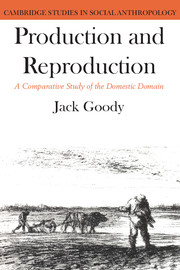Book contents
- Frontmatter
- Contents
- Tables
- Figures
- Preface
- Acknowledgements
- 1 The evolution of the domestic economy: the hoe and the plough
- 2 The theory, the variables and a test
- 3 Making causal inferences
- 4 Farming, labour and sex
- 5 Concubines and co-wives: the structure of roles in Africa and Eurasia
- 6 Adoption in cross-cultural perspective
- 7 Strategies of heirship
- 8 Class and marriage
- 9 Retrospect
- Appendix 1 Tables
- Appendix 2 The probability of family distributions
- Notes
- References
- Index
2 - The theory, the variables and a test
Published online by Cambridge University Press: 05 June 2012
- Frontmatter
- Contents
- Tables
- Figures
- Preface
- Acknowledgements
- 1 The evolution of the domestic economy: the hoe and the plough
- 2 The theory, the variables and a test
- 3 Making causal inferences
- 4 Farming, labour and sex
- 5 Concubines and co-wives: the structure of roles in Africa and Eurasia
- 6 Adoption in cross-cultural perspective
- 7 Strategies of heirship
- 8 Class and marriage
- 9 Retrospect
- Appendix 1 Tables
- Appendix 2 The probability of family distributions
- Notes
- References
- Index
Summary
Much work of an anthropological or sociological kind includes general statements about human societies or about the distribution of forms of marriage (e.g. monogamy or cross-cousin marriage) or types of servile institution (e.g. slavery or clientship). These statements are usually made on the basis of the one or two societies in which the individual has worked (the Trobriands or the Bororo, the Tallensi or the Kachin), together with a number of similar groups from the same region and the handful of others he currently has in memory-store. Other writers such as Spencer, Frazer, Tylor, Westermarck, Hobhouse and Ginsberg, attempted to build up more systematic procedures for the retrieval of information. More recently, the Human Relations Area Files has tried to provide a convenient store of information on a wide range of human societies. For our present purposes, the most valuable source is the Ethnographic Atlas (1967) which systematically codes 89 columns of information on 863 societies from all parts of the globe, enabling us to test various adhesions.
I do not use this technique in opposition to any others but to supplement other ways of examining and developing more general, more systematic and more evidence-provoking theories. Recognising all the problems that other writers have raised, often those writers who feel uncomfortable outside their particular warrens or happier dealing with broader, untestable speculations on humankind, it still seems worth while trying out such methods of testing hypotheses.
- Type
- Chapter
- Information
- Production and ReproductionA Comparative Study of the Domestic Domain, pp. 9 - 22Publisher: Cambridge University PressPrint publication year: 1977



